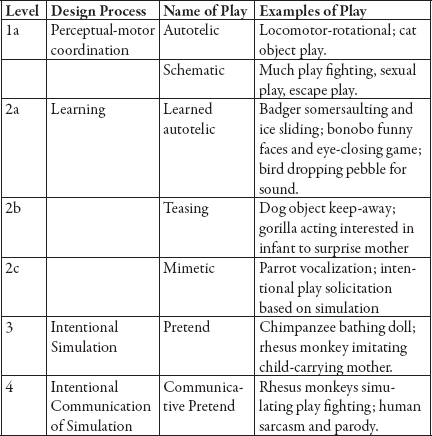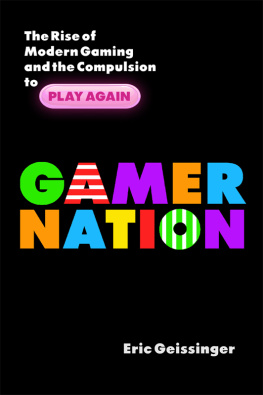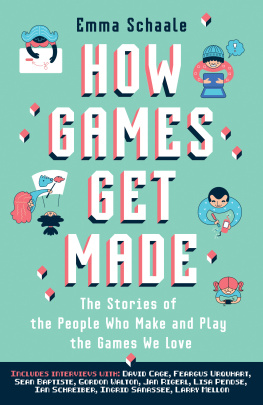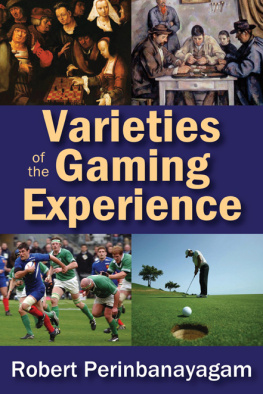
This book would not have been possible without the patience and literary acumen of my wife, Jennifer Wilder, during a year to remember. She's absolutely irreplaceable and I love her dearly. I would also like to thank Sheree Bykofsky, my agent, and everyone who helped me understand how games are produced and distributedparticularly Ramin Shokrizade, who gave me an insider's view of what's going on. Many more helped in direct or indirect ways: Amy Reading and Jay Farmer for emotional support and helpful research material; the Constance Saltonstall Foundation, who got me into gear during a writing retreat; my parents for a game-filled and trauma-free childhood; Nancy and Tim Wilder for stepping up to the plate during various minor disasters and cheerfully lending a hand; the Prometheus team (Steven and Hanna and Mark and all the rest); and my long-suffering editor, Sheila Stewart, who was placed in a wringer as the handle was vigorously turned.
Last but certainly not least I'd like to thank my two daughters, Poppy and Effie, whose high spirits and ongoing support (variously indicated) made every day a bit easier and propelled me toward the finish line a bit faster.

Some nearly universal animal behavior makes intuitive sense. Sexual reproduction is the standard for animal species, excepting a small number of parthenogenetic outliers who are able to reproduce with an unfertilized egg (but these represent a vanishingly small fraction of the overall animal population). That humans share the basic elements of sexual reproduction with the salmon, even if the method of bringing the sperm and egg together is wildly different, doesn't strike anyone as particularly notable. Sexual reproduction has shown itself to be an incredibly effective way to transmit genes, facilitate natural selection through gene mixing, and enable the fundamental evolutionary function of propagating the species. Sexual reproduction is such a useful tool, and so successful from an evolutionary perspective, that it's no surprise to find it up and down the evolutionary tree, ranging from insects to reptiles to mammals. We view a beetle's sexual escapades as both unobjectionable and unsurprising.
It's hard to find other behavioral and biological universals covering a similar range of animal species. The laws of thermodynamics require, at minimum, energy intake greater than output, so you would expect that all animals eat or absorb nutrients, but even here incredibly rare exceptions exist. The Prometheus silk moth, after emerging from its cocoon, has only Animals require oxygen, either from air or water, except animals from a single phylum, the tiny loricifera. In 2010, three species of loricifera were discovered living two miles below the Mediterranean in a brine lake so supersaturated with salt that all oxygen was driven offyet they were able to thrive. Most animals drink water, although paradoxically mammals in marine environments, such as dolphins, produce water internally from the metabolic breakdown of food and most can't be said to drink water during their lifetimes (although seals are sometimes seen eating snow, and manatees are drawn to estuaries for the fresh river water).
These are extreme exceptions. Almost all animals share the following common features: sexual reproduction and the need for food, water, and oxygen. These are fundamental. It seems wrong-headed, if not an outright categorical error, to add another to the list: play.
Play deserves to be on the listafter outlining some obvious limitations.
Play isn't exhibited by all or even most animals. Earthworms don't play, and if they did I wouldn't want to see it. There is a strict correlation between general intelligence and frequency, or likelihood, of play. As you move up the intelligence ladder from insect (rare examples of play), to reptile (occasional examples of play), to birds (extensive examples of play), to mammals (play is ubiquitous), the frequency of play increases, as well as its depth and complexity. Looking only at mammals, we find that mice play simple games, cats slightly more complicated games, dogs surprisingly sophisticated games, and when you get to the great apes the complexity of games explodes. There comes a point in the tree of life at which brainpower reaches a certain threshold, and at that point all animals playthey must play. It's as certain a result as the thermodynamic laws.
Robert Mitchell, conducting animal research in the 1990s, and paralleling the work of many investigators before and after him, categorized play types through strictly defined terms. What follows is his well-known four-level breakdown of animal play, ranging from the simple to the complex:

It's easy to make fun of the nomenclature (is it really necessary to call something Learned autotelic?), but Mitchell's schema is compelling if not definitive. Less sophisticated twentieth-century investigators would have appended another column to the table, explaining the functional or evolutionary benefits of each play type. For example, a chimpanzee simulating the bathing of a doll is a level 3 type of play (intentional simulation), and previous researchers would likely have explained the behavior by pointing to an obvious benefit: bathing a doll prepares a chimpanzee to bathe her actual baby. What could be more obvious?
It makes perfect sensetoo much sense. Playful fighting between jackal babies was understood to be training for real battles later in life. Such an obvious inference hardly required investigation; play fighting enables the development of stronger bodies and more skilled combatants, and kicks off early the relentless social competition found in jackal packs. Cats batting at balls of threads improve paw-eye coordination, leading to better mousing. Dogs chasing each other work wonders on their respiratory and circulatory systems, as well as hone basic hunting skills.
The first researchers to carefully look into these obvious explanatory claims were often mystified by what they found. Female chimpanzees who frequently bathed dolls did not actually become more successful mothers. Jackals raised in big families, with lots of play fighting, didn't fight better than jackals raised alone. Playing around with string doesn't hone a cat's mousing skills. Lastly, dogs chasing each other don't contribute to a recognizable change in their overall health: young dogs are already running around so much for various doggy reasons that the benefits of relatively infrequent games of chase get lost in the wash. While it's clear that some animal games produce direct benefits for some species, in the main these benefits are often 1) incredibly modest given the time and energy of the play involved, or 2) difficult or impossible to detect.
In other words, why do cats play with string when there isn't any direct, measurable benefit to their playing with string?
Robert Mitchell isn't a nineteenth-century, naive, common-sense behaviorist, and he essentially rejects the idea that animal play has any ultimate adaptive or functional aim. He argues that the reasons for animal play aren't hidden or too subtle for our crude yardsticks, but that such cause-and-effect doesn't exist. In Mitchell's view, Play is intentionally directed towards ends, but is unlike other such activities in having 1) no end outside its own enactment, 2) a frivolous end or means, or 3) has an end different from its apparent end.
Next page






![Mark J. P. Wolf (editor) - Encyclopedia of Video Games: The Culture, Technology, and Art of Gaming [3 volumes]](/uploads/posts/book/279290/thumbs/mark-j-p-wolf-editor-encyclopedia-of-video.jpg)






